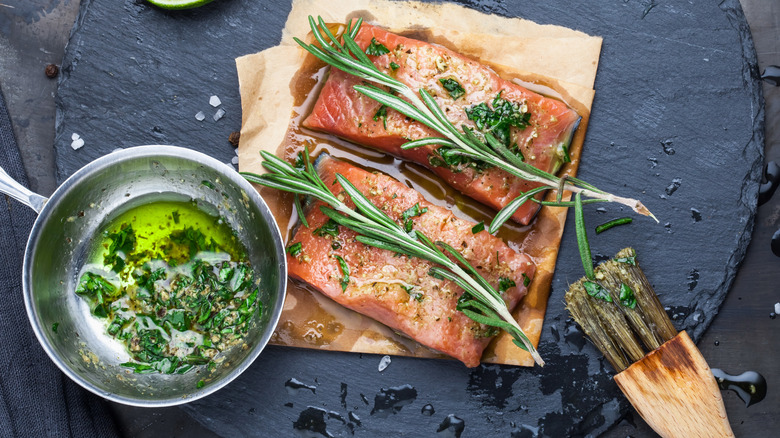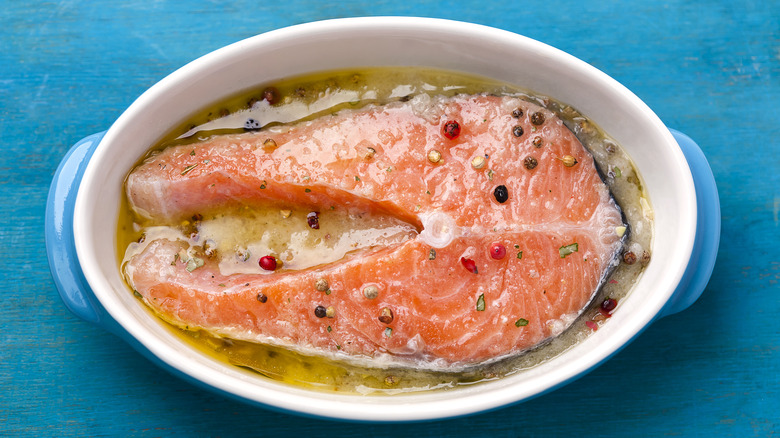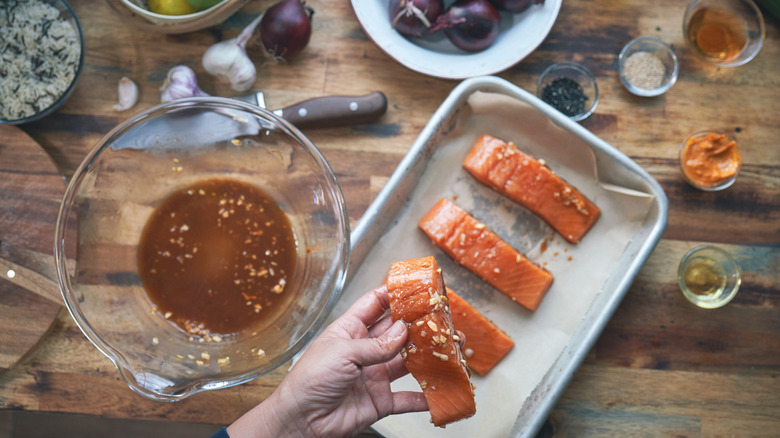How To Marinate Seafood Like A Chef
Marinating food is a time-tested technique that chefs and home cooks rely on to create well-seasoned dishes. Soaked in a solution made with oil, an acidic agent, and spices, your main ingredients get infused with flavors they wouldn't get otherwise simply from getting cooked with heat.
But while both proteins and vegetables could use some magic from a marinade, there is no single marinating process that applies to all kinds of food. What works for meat would be detrimental to veggies since they need a much shorter time length for soaking. The same goes for seafood if you want its briny flavor to still shine through and its flesh to remain soft and moist.
Tasting Table asked Jenn Segal from Once Upon a Chef for tips on how to marinade seafood the way chefs do. "Seafood needs a lighter touch so stick to non-acidic elements like lemon or lime zest, oil, spices, and fresh herbs," she advised. While acids like lemon juice work well for marinating meat, they can be too strong for the more delicate flesh of seafood and end up cooking them before they're even put in a pot, pan, or on the grill. This would be fine if you're making ceviche but not if you're cooking a different dish.
Another factor to consider is how long you let them soak. Segal cautioned, "Remember, seafood marinates quickly — 20 to 30 minutes max." Soaking them too long, even in the right marinade, will end up cooking them as well.
An oil-based marinade lets seafood brown nicely on the outside
Aside from swapping acid with a citrusy zest to give your seafood marinade a lighter but still flavor-brightening tang, use oil to make your marinade rather than water-based ingredients like wine, beer, and juice. This ensures that your seafood will develop a nicely browned exterior while still remaining tender inside. In comparison, cooking seafood after coating it with a water-based marinade will simply create steam once you put it in heat due to the excess water. The fats in olive oil, sesame oil, peanut oil, and the like also aid in infusing the food with fat-soluble flavors, which will help temper any strong or sharp taste that could overwhelm the natural flavor of your main ingredient.
If you are curious about where fish falls within the prescribed time window for marinating seafood, check the texture of its flesh. Big fish like halibut, tuna, and blue marlin have firm flesh that can withstand a longer soak with a stronger marinade. Meanwhile, flaky fish like haddock, cod, and pollock have a mild flavor and tend to fall apart when grilled. They fare better with a shorter marinating time and a lighter marinade.
Remember to put seafood in the fridge as you marinate it. Set the timer halfway through the process so you're reminded to flip the food over. That way, both sides get soaked evenly. You can also massage the marinade into the seafood every 15 to 20 minutes when using a sealed bag.
Use spices to infuse seafood with a complementary flavor
If you've ever enjoyed a seafood dish that's prepared Mediterranean-style or Asian-style and wish you could recreate it at home, the spices and herbs you add to your marinade can help evoke the flavor profile you want. Create a marinade with sesame oil, freshly grated ginger, chopped scallions, and soy sauce or oyster sauce for an Asian-inspired dish. For something with delicious heat, mix your choice of oil and lime zest with pureed chipotle, salt, pepper, and garlic; this works really well with Mexican-style grilled shrimp. Meanwhile, adding chopped tropical fruits like mangoes and guavas to the marinade will result in a bright and zesty plate.
You can use brown sugar mixed with fish sauce to give your seafood a nice caramelization but watch carefully as you cook the food since sugar burns easily. (Caramelized seafood may sound strange but it's featured a lot in Vietnamese cuisine.) Other sweetening agents that can give your dishes a nice crust are cinnamon, cloves, and nutmeg. And of course, you can't go wrong with the classic garlic, onions, pepper, rosemary, dill, and chives.
Remember to stick to one flavor profile, though, and keep your seafood marinade simple. If you're not following a recipe, use a small amount of spices and other flavoring agents first then build on them as you develop your formula through practice. After all, you still want your seafood to be the main attraction of the dish, not the seasonings.


